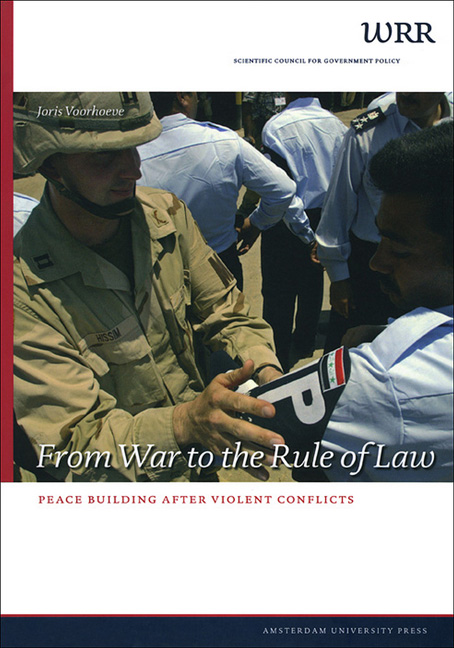Book contents
- Frontmatter
- Dedication
- Contents
- Preface
- 1 Why this Study?
- 2 An Overview of Peacebuilding
- 3 Towards Typology and Theory
- 4 (Re) Establishing Order
- 5 (Re) Building the Rule of Law
- 6 Resources and Costs
- 7 The European Union and Post-Conflict Peacebuilding
- 8 Conclusions and Recommendations
- List of Country Illustrations, Tables, Text Boxes and Maps
- Acknowledgments
- Further Reading
- Some Relevant Websites
5 - (Re) Building the Rule of Law
Published online by Cambridge University Press: 14 January 2021
- Frontmatter
- Dedication
- Contents
- Preface
- 1 Why this Study?
- 2 An Overview of Peacebuilding
- 3 Towards Typology and Theory
- 4 (Re) Establishing Order
- 5 (Re) Building the Rule of Law
- 6 Resources and Costs
- 7 The European Union and Post-Conflict Peacebuilding
- 8 Conclusions and Recommendations
- List of Country Illustrations, Tables, Text Boxes and Maps
- Acknowledgments
- Further Reading
- Some Relevant Websites
Summary
The foundation for future rule of law is to be laid in the transitional phase, which was surveyed in the previous chapter. Transitional politics may have led to a provisional constitution or a basic agreement which will later on lead to a new constitution. Transitional ‘justice’ may have started purging the country of war criminals, war profiteers and serious collaborators with criminal political behaviour during the previous regime. Emergency laws may have facilitated the return of physical security. A beginning may have been made with disarmament, demobilisation and reform of the armed forces, the police and the intelligence services. A gradual return of public order may now enable efforts to lay the foundation for future rule of law. In the present chapter, the (re)building and reform of the legal and judicial sector will be briefly discussed.
THE ROLE AND RULE OF LAW
The ‘role’ of law is to settle conflicts equitably, to protect people's security and property, to restrain the use of political power by subjugating it to the law, and to guarantee basic human freedoms, in order to enable individuals and society to thrive.. The first task of public law is to help provide basic human security and replace arbitrary rule, that is: achieve rule by law, which should in turn, develop further into the rule of law, in which the ‘rulers’, the administration and judicial and police system, are subject to the laws of the land as well as international law. We do not discuss here the role of private law, however important for peaceful life, reconstruction and development, as this study focuses on public policy in post-conflict peacebuilding. The main elements of a complete rule-of-law system are:
– An independent judiciary;
– independent human rights institutions;
– government powers that are determined by laws;
– free and fair elections;
– transparent and accountable access to political power;
– police and detention systems whose powers are defined precisely by laws;
– military and security systems that function under the law;
– access to justice through competent and affordable lawyers, and no prohibitive levies or delays which discourage seeking justice.
The ultimate purpose of rule of law is to implement basic human rights as enshrined in advanced constitutions, which in turn reflect the international human rights treaties.
- Type
- Chapter
- Information
- From War to the Rule of LawPeace Building after Violent Conflicts, pp. 91 - 126Publisher: Amsterdam University PressPrint publication year: 2007



